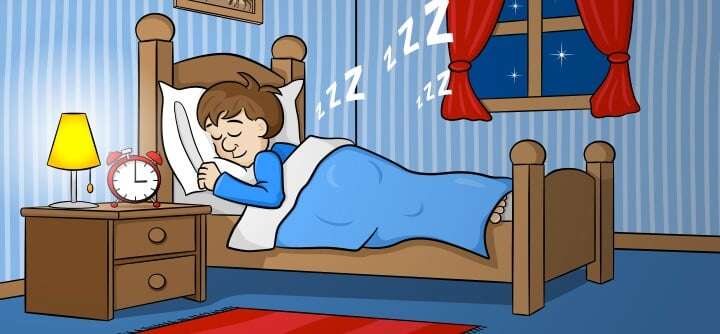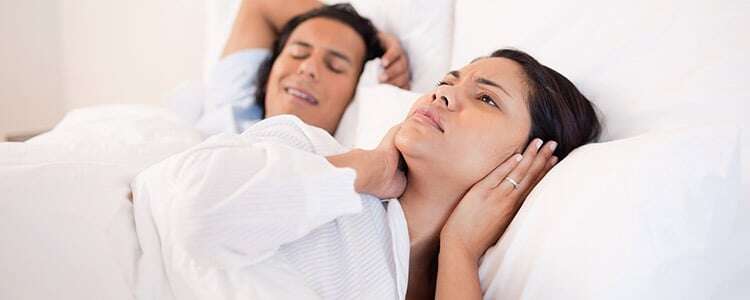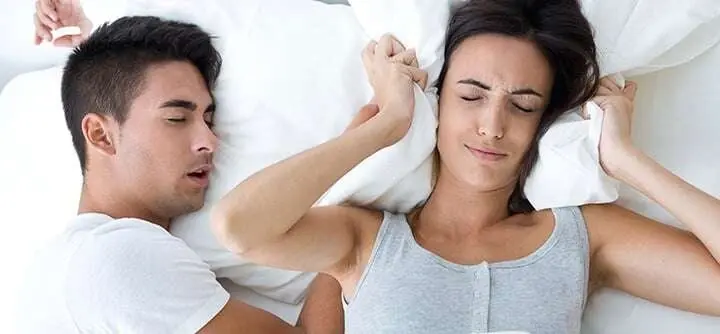How can I sleep without snoring?
It’s a common question from those of us who are noisy at night-time.
If you’re desperate for a silent night and want the answer on how to rest without distributing your entire household, there are some solutions which can help you to sleep soundly.
But have you ever stopped to question whether your snore sessions are trying to tell you something?
Often, it’s the people who are curious on how to stop snoring that later discover that they have sleep apnea. That’s because most people with sleep apnea don’t even know they have it.
Perhaps your partner has commented on your snoring and now you’re starting to explore how to fix the problem. If that’s you, now is the time to explore your sleeping habits to check that your snoring doesn’t represent a larger health concern, such as sleep apnea.
However, keep in mind that if this does turn out to be the case, you wouldn’t be alone – there are plenty of people who are also in your snoring shoes!
Obstructive Sleep Apnea (OSA) is the most common sleep disorder. It occurs when breathing is blocked during sleep, causing pauses and shortages to breathing that often result in snoring.
While snoring is one of the symptoms that you may have sleep apnea, it doesn’t necessarily mean that you do have the sleep condition.
There are other symptoms of sleep apnea to be on the aware of, including:
- Daytime drowsiness
- Loud persistent snoring
- Excessive sleepiness during waking hours
- Morning headaches
- Lack of energy
- Poor concentration[1]
If you have two or more of the listed symptoms above, there is a probability you have sleep apnea. Now is the time to take our Online Sleep Assessment. It's fast, free and could improve your sleep dramatically.
If you’re concerned about your snoring situation, ask yourself whether you have these other symptoms, too. If the answer is no, you may simply be experiencing one of the many other reasons of snoring aside from sleep apnea. You can put to bed any questions over your own sleep apnea risks to bed.
For example, an incorrect sleeping posture can lead people to snore and it’s usually more prevalent when you get older, as the muscle tone in your throat which usually keeps the airway open starts to loosen.
Are there practical things I can do to stop snoring?
Yes. If snoring is the only problem and there isn’t a wider health concern such as sleep apnea, then there are practical things you can do to help your situation.
Proactive steps you can take to sleep without snoring, include:
- Give up the grog. You don’t have to give up alcohol cold turkey, but reducing your alcohol intake will improve your quality of sleep. You might think that alcohol actually helps to put you into a satisfying slumber, but it can have a negative effect on the quality of your sleep.
- Put the cigarette down. Smoking simply isn’t benefiting your throat, so if you do smoke it may be leading you to snore. Try and cut down or quit altogether and see if you notice an improvement.
- Move more. Do the benefits of exercise ever end? Get out and about and start moving by committing to a regular exercise routine. Not only will it improve your mood and physical and emotional health, but exercising daily is a sure way to sleep better[2].
Tried these tips and still snoring? Read on - there are plenty of solutions available.
What do I do if I have two or more of the above listed symptoms?
If it’s not just snoring that you’re worried about but also morning headaches, excessive sleepiness or a lack of concentration, it’s time to take the appropriate action and put to bed any questions on whether you have sleep apnea. We have a free Online Sleep Test to help you find out.
The process of elimination can start today – you don’t have to wait until a potential diagnosis to take action.
It might sound confronting, but keep in mind that sleep apnea is the most common sleeping disorder and there are solutions available to help treat the condition.
Firstly, book in a time with your GP or a sleep specialist to establish whether you do have sleep apnea. They may recommend a home sleep test to confirm the diagnosis.
Once this is done, rest assured that you’re on the right track and making progress to fix the problem. The fact that you’re reading this blog indicates that you want to do your research - and that’s a great place to start!
You can also take comfort in knowing that the EdenSleep website you’re reading right now is a handy resource available to you at any time – here on this blog you’ll constantly find new information appearing which is all designed to help you with your sleep apnea.
The next step is to take our free Online Sleep Assessment, which has been designed to uncover if you are at risk of any serious sleeping disorders that should be addressed.
By using these sorts of tests and seeking information as you're doing now - you’re on your way to achieving long-term, restful sleep.
The sooner you start, the sooner you – and your partner – can rest easy!
.webp?width=1158&height=143&name=Combined%20logo%20-%20Ecom%20Main%20300x200%20(1).webp)




